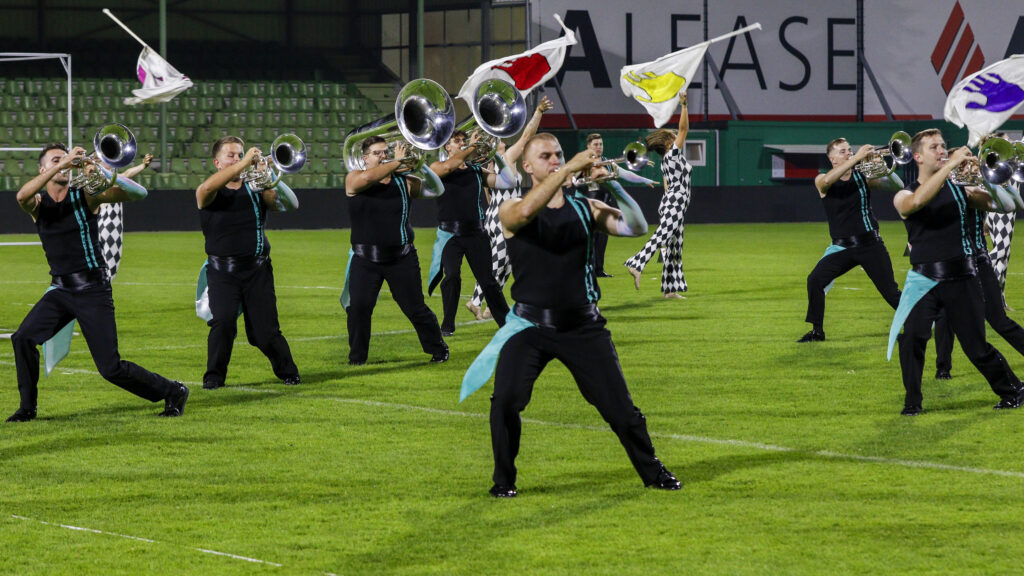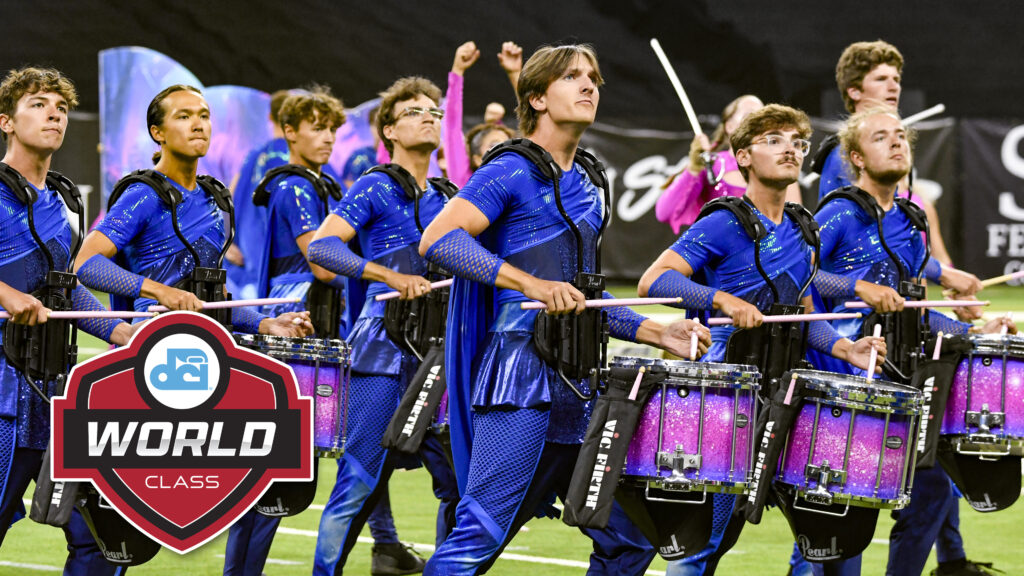
Chuck Naffier is well known to drum corps fans. He served as brass arranger for Colts from 1990 through 1999, helping guide the corps through its quest to become a DCI World Championship Division I finalist, (which happened for the first time in 1993). Since then, he has also arranged for Crossmen, Bushwackers and Taipei Yuehfu. He responded to my request for stories about how corps members first got involved with DCI corps.
It’s not an unusual story, but it’s so appropriate to share because Chuck’s introduction to drum corps is representative of how so many of us first fell in love with the activity. Chuck had more of a chance than most to discover drum corps. He grew up in Dubuque, Iowa, home of the Colts. He saw them in parades in the mid-1970s, when the corps was still known as the Colt 45’s, remembering thinking, “Wow! Cool cowboy uniforms.” He also duly noted that the corps played loud, or as he remembers it, “Loud!” A number of Chuck’s fellow band members were already in Colts, and over the next four years, they were relentless in their encouragement that he should check out a corps rehearsal.
These corps members were among the best players in the band, which was a little intimidating to Chuck. He admits to not being the most outgoing teen-ager at the time, which added to the intimidation. Today, he says he wishes he had listened to them earlier, as that would have given him more years to march. Then, in 1980, during his junior year in high school, Colts’ corps director Jim Mason gave a presentation during band class at Dubuque Senior High School.
Jim showed some highlights from the 1979 Drum Corps International World Championships, and Chuck was flabbergasted. He was now a pretty decent trumpet player, having played since the 5th grade. He performed in pit orchestras for local musicals and marched parades as well as played Sunday park concerts with the local Dubuque Community Band, all which required him to be a card-carrying member of the local musician’s union.
After Jim assured him that involvement with the union did not prevent him from playing in Colts, he went to a corps rehearsal with a friend, where he was promptly thrown into the drill to “sink or swim.” Having only marched pinwheels and standstill “picture” shows in his high school marching band, Chuck found the whole experience to be more than a bit challenging. However, he remembers he didn’t injure anyone near himself. Jim Mason mercifully pulled him off the field for a playing audition. Chuck had no problem playing a low C, middle C and high C, but when Mason asked him to play a grand C, he produced only air.
Chuck knew he didn’t have that kind of range, but Jim told him to listen to a soprano soloist on the field, playing the solo to “Summertime” that will be remembered by many corps fans. That soloist was Greg Blum, who years later was brought in by Jim to work with Star of Indiana. Chuck wanted to play like Greg, and Jim said he could teach him to do that if he joined the corps. So, after rehearsal, Chuck found himself going home with soprano bugle case #8. A few days later, Chuck got cold feet when it came time for his first camp, plagued by major confidence issues. He summoned up the courage to phone Jim Mason to tell him in person that he would not be joining the corps. When he got to the point of saying, “Thanks anyway,” Jim headed him off at the pass by stating, “Just try the weekend.
There’s no way to really know what you’ll be missing until you go through a whole camp.” Chuck knew that Jim had him over the proverbial barrel. The only thing to do was to follow through with his short-term commitment, and then quit. Chuck got a ride in a car filled with other kids be barely knew. At the Friday night camp, the brass line played through the entire show in a school gymnasium.
The 50 or so horn players were sweating profusely as they marked time in the hot, humid gym. Like a marathon runner experiencing “runner’s high,” Chuck felt exhilarated, despite the environmental conditions. He had never before experienced such a feeling, and he craved for more. He got it the next day when the corps worked on learning drill in a parking lot until well after dark.
[By now, many of you are thinking, “Been there, done that.] Chuck memorized three pieces that day, carrying his sheets of music everywhere and stealing a glance at them while learning the drill sets for the parts of the show the corps had been taught. Under lights, the corps played through the show up until midnight. On Sunday, though enjoying the experience, Chuck was still not committed to marching with the corps. But then the corps learned the music to the closer, “Smile,” and Chuck was touched on some unexplainable emotional level that many of us have experienced during our introduction to drum corps.
In short, he was hooked on drum corps and his life would never be the same from then on. As he recounts, “When I walked into that camp, I had three friends, a couple of acquaintances, and I knew nothing. When I walked out, I had many friends, had met the staff members who would be my teachers for the next five years, and had surprised myself by learning the entire show in just two days. I left that camp sunburned, tired, and knowing I would be sticking around for the 1980 season just to see what this whole ‘drum corps thing’ was all about.”
Twenty-three years later, drum corps is still Chuck’s life and love. He concludes with, “My life is very different than I could have ever imagined as a timid 16-year-old kid, and I’ll always be grateful for the opportunities and motivation I got as a result of my first year in an activity that has become my life!”
Michael Boo has been involved with drum and bugle corps since 1975, when he marched his first of three seasons with the Cavaliers.
He has a bachelor’s degree in music education and a master’s degree in music theory and composition.
He has written about the drum corps activity for over a quarter century for publications such as Drum Corps World, and presently is involved in a variety of projects for Drum Corps International, including souvenir program books, CD liner notes, DCI Update and Web articles, and other endeavors. Michael currently writes music for a variety of idioms, is a church handbell and vocal choir director, an assistant director of a community band, and a licensed Realtor in the state of Indiana. His other writing projects are for numerous publications, and he has published an honors-winning book on the history of figure skating. His hobbies include TaeKwonDo and hiking the Indiana Dunes. But more than anything, Michael is proud to love drum corps and to be a part of the activity in some small way, chronicling various facets of each season for the enjoyment of others.





